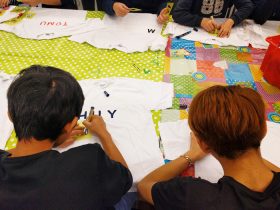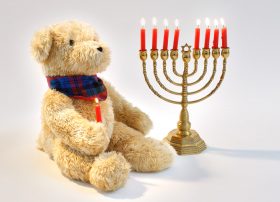Workshops for young refugees

Whether in Hebrew, Arabic, or German, there are lots of ways to write one’s name; photo: private
What’s written in a Jewish marriage contract? As a minority, how do you secure your civil rights? And why is Hanukkah celebrated for eight days? My work as a guide at the Jewish Museum isabout how to coax stories from objects on display — but also about language. The first thing I did when I began working here about four years ago was to look up how to say “ruminants with cloven hooves” in French. You need to have this phrase at the ready if you want to explain Jewish dietary laws to a group of French museum visitors. My French didn’t help much, however, when I led the first workshops in August of 2016 for Welcome Classes. → continue reading
 “Jewrovision”, the largest singing and dancing competition for Jewish youth in Europe, will take place this year for the 16th time. Last year an audience of over 2,000 gathered at the Rose Garden Hall in Mannheim, accompanying the brilliant stage show produced by youth centers with frenetic applause. It’s hard to imagine that Jewrovision 2002 was just one of a number of evening programs at a Jewish recreational camp called Machané. Back then, at a recreational center in Bad Sobernheim (not far from Frankfurt), six groups from various cities appeared on a stage just three yards wide. Today, only 15 years later, there are 18 teams presenting their multi-media performances on enormous stages in much larger venues. An extraordinary development. → continue reading
“Jewrovision”, the largest singing and dancing competition for Jewish youth in Europe, will take place this year for the 16th time. Last year an audience of over 2,000 gathered at the Rose Garden Hall in Mannheim, accompanying the brilliant stage show produced by youth centers with frenetic applause. It’s hard to imagine that Jewrovision 2002 was just one of a number of evening programs at a Jewish recreational camp called Machané. Back then, at a recreational center in Bad Sobernheim (not far from Frankfurt), six groups from various cities appeared on a stage just three yards wide. Today, only 15 years later, there are 18 teams presenting their multi-media performances on enormous stages in much larger venues. An extraordinary development. → continue reading
“8 Facts” about the Jewish Feast of Dedication

Jewish Museum Berlin, photo: Jens Ziehe
1
The history of the Jewish Festival of Lights is about the one temple in Jerusalem. To be precise, about its re-consecration (“Hanukkah”) in the year 164 B.C.E. after it had stood for many years under Syrian-Greek control.
2
During this period of foreign rule, two groups were in conflict: on the one side was the Seleucid Empire under Antiochus IV Epiphanes, while on the other side were the courageous Maccabees led by the priest Mattathias and his sons. → continue reading


